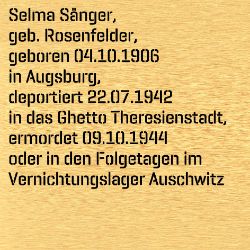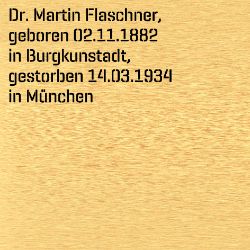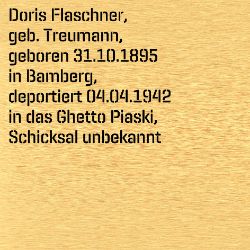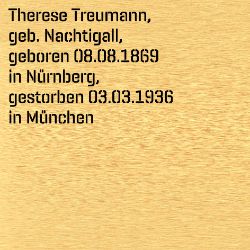Karl Heinrich Flaschner was born in Munich on August 28, 1924, the son of the lawyer Dr. Martin Flaschner and his wife Doris, née Treumann. From around 1920, Martin Flaschner was the legal advisor to the Munich Jewish Cultural Community and to the Association of Bavarian Jewish Communities. Heinrich grew up with his sister Hanna, who was four years his senior.
To begin with, the family lived at Herzogstrasse 58, and then, from 1927, at Haimhauserstrasse 18 (today 2). In January 1933, Heinrich’s widowed grandmother Therese Treumann came to live with the family. The premature death of his father on March 14, 1934 must certainly have been a heavy blow for nine-year-old Heinrich. His grandmother, Therese Treumann, died just under two years later on March 3, 1936.
In May 1937, Heinrich’s sister Hanna left Munich to undergo a hakhshara, an agricultural traineeship in preparation for emigration to Palestine, on a farm in Gross-Breesen near Breslau. A little while later, on August 7, 1937, Heinrich celebrated his bar mitzvah in Munich’s Main Synagogue, which was certainly a wonderful experience for the twelve-year-old. In December 1939, he and his mother were forced to leave their flat at Haimhauserstrasse 18 and were quartered at Goethestrasse 23 and ten months later at Landwehrstrasse 6, where they had to live in “Jew flats” in very cramped conditions. In 1940, Heinrich Flaschner also decided to undergo a hakhshara traineeship at the agricultural training centre of the Zionist Youth Associations on the farm Gut Winkel in Spreenhagen and in the Hakhshara Centre of the Zionist youth movement Makkabi Hazair in Ahrensdorf near Trebbin, both in Brandenburg. He clearly hoped to be able to emigrate to Palestine. But his plans failed. In December 1941, the Secret State Police (Gestapo) quartered him in the barrack huts of the "Judensiedlung" ("Jewish Quarter") Milbershofen at Knorrstrasse 148. Together with his mother, Heinrich Flaschner was deported to the Piaski Ghetto on April 4, 1942. His cousin, Anneliese Treumann, the daughter of Heinrich Flaschner’s uncle Martin Treumann, was also deported to Piaski. All trace of the three is lost there. Where and when they perished is to this day unknown. Heinrich Flaschner’s sister Hanna managed to emigrate and later lived in Australia. His uncle, Martin Treumann, also survived the Shoah. (Text: B. Hutzelmann; translation: C. Hales; editor: Ch. Fritsche)



-Flaschner_portrait.jpg/jcr:content/PORTRAIT_14954.jpg)




